How To Get Rid Of Sugar Ants In The House
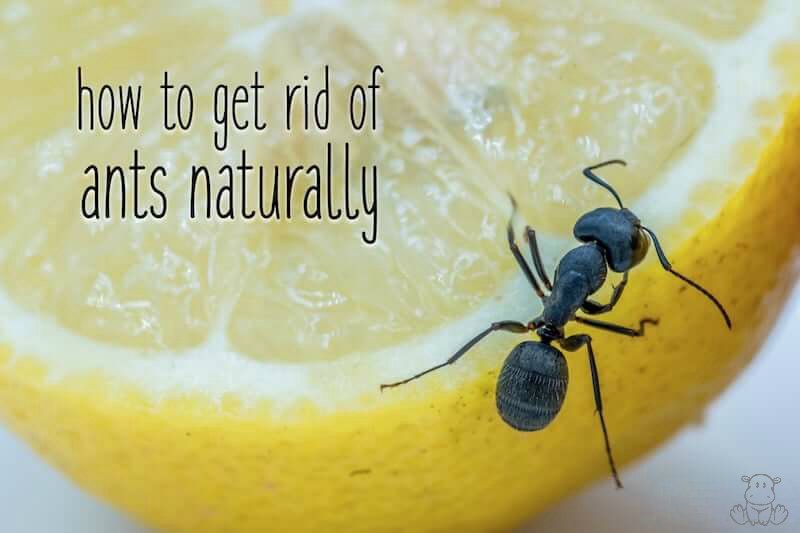
It was a compliment, I'm sure, the way ants descended on my kitchen. The sticky sweet smell of homemade strawberry jam is irresistible if I do say so myself. But after watching them take an afternoon dip in my coconut oil I wasn't feeling very hospitable.
I draw the line at coconut oil, y'all. It was officially an ant problem.
Certain spices, such as cinnamon and cayenne pepper, are thought to repel ants, but I haven't had much luck with them. So a few years ago, I dug around on some university entomology pages for effective alternatives to synthetic pesticides. Below are the methods that they recommended, and I'm happy report my kitchen is now ant-free.
How To Get Rid Of Ants Naturally
Before getting started with the pest control methods below, it's important to identify whether the invading ant species can cause other problems.
My region has mostly odorous house ants and pavement ants, but there are carpenter ants in the area, too. They can cause structural damage to the home, so I used this identification guide to make sure I wasn't dealing with them before moving forward.
Fortunately, fire ants don't usually invade houses, so that's one less thing to worry about.
1. Borax & Sugar Water Method
This method, combined with the Ant Spray Recipe below, is what has worked best for me. The Borax/sugar water serves as ant bait that the scout ants take back to the colony, then the Borax does its work.
How To Get Rid of Ants Naturally With Borax And Sugar Water
This highly effective method for getting rid of ants only requires a few simple ingredients and some cotton balls.
Prep Time 10 minutes
Cook Time 5 minutes
Total Time 15 minutes
Calories
-
small or medium sized pot
-
measuring cup – ½ cup
-
measuring spoon – 1 tablespoon
-
measuring spoon – ½ tablespoon
-
tongs
- 6-12 individual cotton balls
-
Dissolve 1/2 cup of sugar and 1.5 tablespoons Borax in 1.5 cups warm water.
-
Using tongs, dip cotton balls in the water/Borax/water mixture.
-
Using tongs, place soaked cotton balls in shallow containers around the affected area.
Resist the urge to kill the ants that swarm because you need them to take the Borax back to the colony. After doing this a couple of times and cleaning the kitchen thoroughly our ants were completely gone.
Alternative: Some ants prefer protein to sugar, so if the cotton balls don't work try mixing borax with some peanut butter and placing it in a few small dishes for the ants to find.

2. Essential Oils (Ant Away Spray Recipe)
When a forager goes out and discovers food, it marks the path from the food to the nest using a pheromone trail. Other ants, who smell with their antennae, then follow the path. Certain botanical scents, which are rich in essential oils, help erase ant trails so that the ants can't return to food sources.
Here are a few of the most effective ones, along with a recipe for Ant Away Spray.
Peppermint Essential Oil
Not only does this one really work, it smells great to boot! It's often used to support alertness and mental clarity. Not a bad oil to have around, huh? Here's where to buy it.
Tea Tree Essential Oil
Tea tree is a great all-purpose oil to have around. I use it often in homemade cleaners and natural remedies. Where to find tea tree oil.
Clove Essential Oil
In addition to disrupting scent trails, clove oil kills ants on contact.
Eugenol is a component of clove oil. It is a fast acting contact insecticide that is effective on a wide variety of household pests such as cockroaches, ants, dust mites, flies, wasps, spiders, crickets, and fleas. It is also used on some ornamental plant pests such as armyworms, thrips, aphids and mites.
Eugenol has little or no residual activity [meaning it's effectiveness fades quickly], although the scent of cloves will linger. Products based on eugenol are considered minimum risk pesticides with very low risk of damage to the environment or user." (1)
Clove oil is very strong, so I recommend using it in very small amounts as reflected in the recipe below. Where to find clove oil.
Lemon or Orange Essential Oil
Citrus oils contain d-limonene, which is toxic to ants. It also masks their scent trails. Orange, lemon and grapefruit essential oils all contain d-limonene.
Where to find orange essential oil, grapefruit essential oil and lemon essential oil.
Ant Away Spray Recipe
Now that we've covered some of the most common essential oils used to repel ants, here's how to use them to make ant away spray/
Ingredients:
- 1/4 cup purified water
- 1/4 cup vodka or rubbing alcohol (Used to help suspend the oil in the water. If you don't have any available you can just use water and shake often)
- 15 drops peppermint essential oil
- 15 drops tea tree essential oil
- 7 drops citrus essential oil (orange, lemon, grapefruit, etc) OR 1-3 drops clove essential oil
Instructions:
Pour vodka (or rubbing alcohol) into a small spray bottle. Add the essential oils and shake well to combine. Add in the water and shake again.
How To Use The Essential Oil Ant Spray:
Shake the bottle, then spray on the floor near baseboards, crevices and other other entry points for ants, plus anywhere you've seen ants. Repeat every few days until ants are completely gone.
Note: If used in strong enough concentrations, essential oils can degrade some surfaces – plastic, painted, or stained surfaces are a few examples. I only use this spray on my tile floors that are resistant to them.
If you're spraying on a food surface like kitchen countertops, omit the tea tree oil and add 15 drops peppermint oil.
Ant Spray Substitutions
If you only have tea tree or peppermint essential oil you can use them solo. Just add 37 drops of either one to the vodka and water.
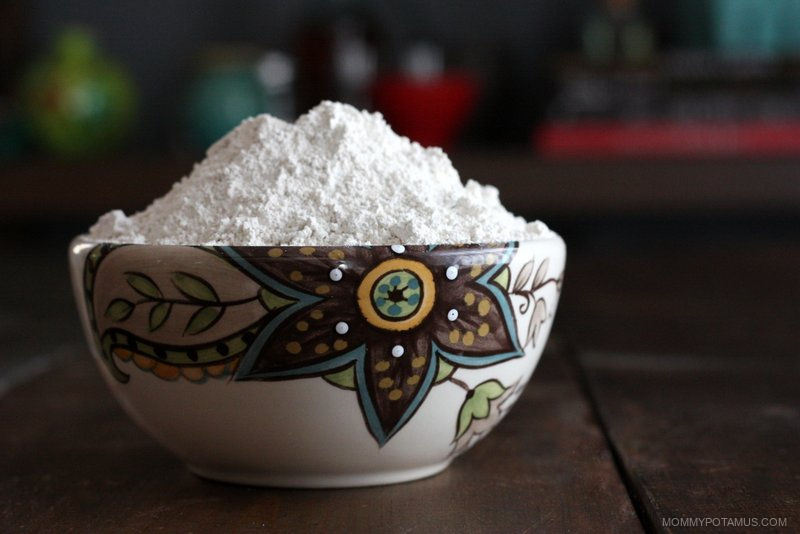
3. Food Grade Diatomaceous Earth
Food grade diatomaceous earth (DE) is "an off white talc-like powder that is the fossilized remains of marine phytoplankton. When sprinkled on a bug that has an exoskeleton (such as bed bugs, ants or fleas) it compromises their waxy coating so that their innards turn into teeny tiny bug jerky. But it doesn't hurt mammals. We can eat it. " (2)
And in fact many do. It's rich in silica, which is good for hair and nails, and is thought to help clear parasites and bacteria, heavy metals, etc.
It's also odorless and non-staining, and can be used safely indoors on many types of surfaces.
How To Get Rid of Ants With Diatomaceous Earth:
Gently sprinkle a thin layer in places ants are likely to be: on windowsills, beneath the fridge, under cabinets, garbage cans, etc.
Note: DE that is used to filter pools is not safe to breathe. Food grade DE is. More info here.
Here's where to buy food grade diatomaceous earth.
4. White Vinegar
Like essential oils, the smell of vinegar repels ants and also masks their scent trails. It is best used with another repellent, like citrus peels or essential oils.
How To Make Vinegar Spray:
Add 1/4 cup white vinegar and 1/4 cup water to a spray bottle. Add 30 drops of one of the essential oils listed above, if desired. (If you are using clove oil, I recommend using just a few drops as it is very strong)
How To Use The Spray:
Shake the bottle, then spray your vinegar mixture around the baseboards and any known entry points, plus anywhere you've seen ants. Repeat every few days until ants are completely gone.

5. Citrus Peel Spray
Waste not, want not, right? This easy DIY citrus infused vinegar is a great way to use leftover lemon or orange peels from your most recent batch of lemon jello or gummy snacks.
How To Get Rid of Ants With Citrus Spray:
Shake the bottle, then spray your citrus vinegar around entry points and near baseboards. This spray is also ideal for use on most countertop surfaces. Repeat every day until the ants are gone.
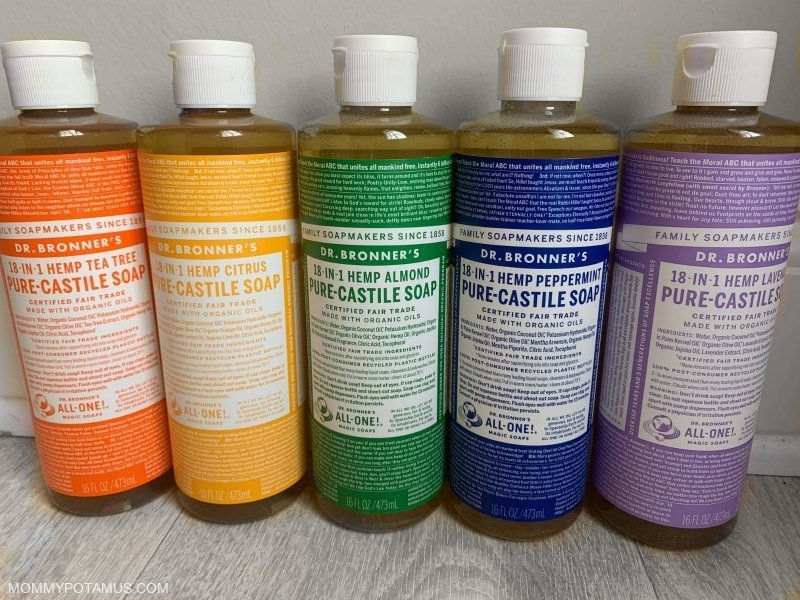
6. Castile Soap
Like diatomaceous earth, soap also dissolves the waxy coating on the outside of the ant.
How To Make Bronner's Soap Spray:
Fill a 1 quart spray bottle almost all the way to the top. Add 1/4 c. peppermint castile soap (or other liquid castile soap), attach nozzle, and shake gently to mix.
How To Use The Spray:
Shake bottle, then spray around baseboards and entry points for ants. Repeat daily until ants are completely gone.
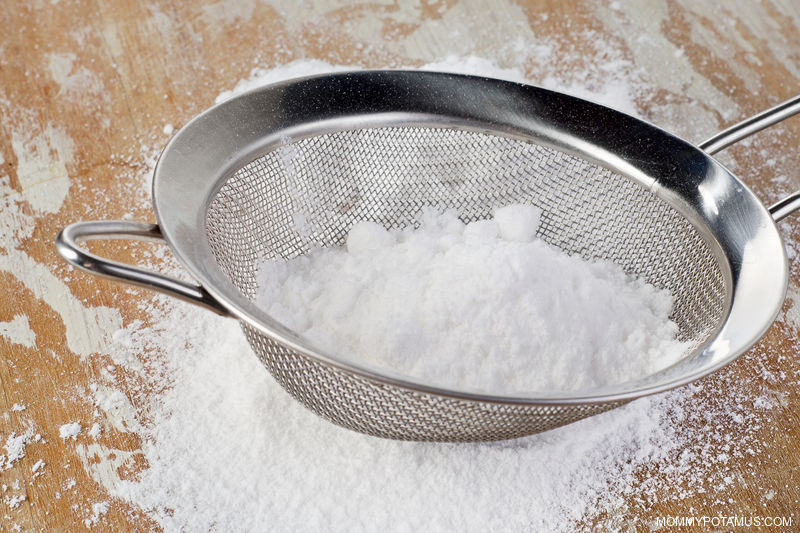
7. Baking Soda & Powdered Sugar Method
This is the same concept as the boric acid/sugar method, just with different ingredients. The powdered sugar attracts the ants and the baking soda kills them.
Mix 1 part sugar with 1 part baking soda and then place your mixture in shallow lids wherever you see ants. Just like with the borax solution, resist the urge to kill the ants that swarm because you need them to take the mixture back to the colony.
When they gather the sugar they also take the baking soda, which reacts with the acid in their digestive system and kills them.
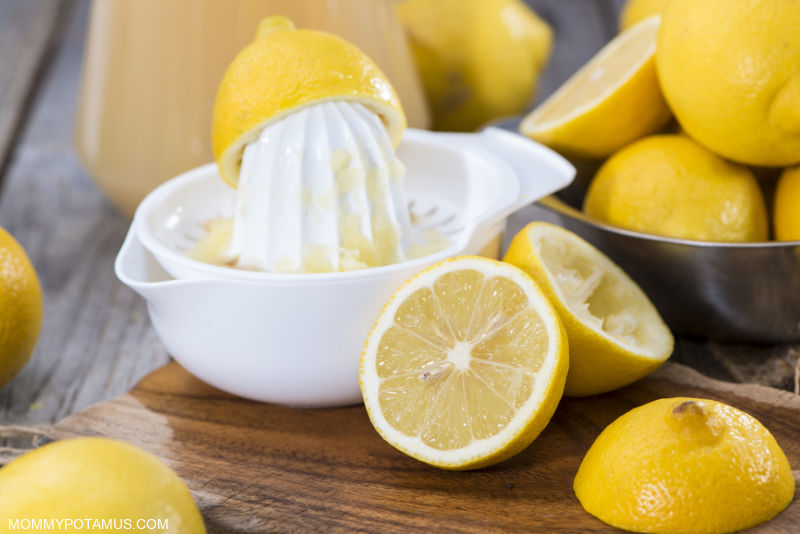
8. Lemon Juice
Works for the same reason as vinegar. It is best used with another repellent, like essential oils.
How To Make Lemon Juice Spray:
Add half lemon juice and half purified water to a spray bottle. Optional: Add 15 drops of lemon, orange, peppermint or tea tree essential oil for every 1/4 cup.
How To Use The Spray:
Spray around baseboards, entry points for ants and just about anywhere you've seen ants. Repeat every day until ants are completely gone.
Other Tips For Getting Rid of Ants In The House
These habits are helpful for both dealing with a current ant infestation and preventing a future one.
- Keep the kitchen sink and countertops clean and dry so that food residue does not attract ants
- Sweep and mop the floor daily until the infestation resolves
- Keep all food, especially tempting things like honey and maple syrup, in airtight containers
- Empty kitchen trash cans regularly so that food smells don't draw ants
- Keep pet food bowls clean and wipe up any food or water that is spilled
- Caulk any unnecessary entry points (weathered window seals, etc.)
How To Get Rid of Ants Outside
If you see anthills or ant colonies outside that could be the source of the issue, try pouring boiling water over it. The water will kill lots of ants and probably collapse the nest, which will encourage any that are left to relocate somewhere else.
Products Mentioned In This Post
- Borax
- Peppermint essential oil
- Tea tree essential oil
- Clove essential oil
- Orange essential oil
- Grapefruit essential oil
- Lemon essential oil
- Diatomaceous earth
- Dr. Bronner's soap
Do you have a tried-and-true method for keeping ants away?
Please share it below!
Want a FREE ebook of non-toxic cleaning recipes that WORK?
I've created a free ebook for you as a gift for signing up for my newsletter. 7 Non-Toxic Cleaning Recipes That Really Work covers seven recipes that you can make in just a few minutes each for squeaky clean windows, sparkling dinnerware, lemon-fresh countertops, and more. Subscribe to my newsletter below and you'll be redirected to a download page for immediate access to this PDF ebook.
Sources:
1. Clemson University Cooperative Extension Service. Less Toxic Insecticides.
2. Diatomaceous Earth (Food Grade): Bug Killer You Can Eat.
3. University of Florida Department of Entomology and Nematology
4. Texas A&M University Department of Entomology
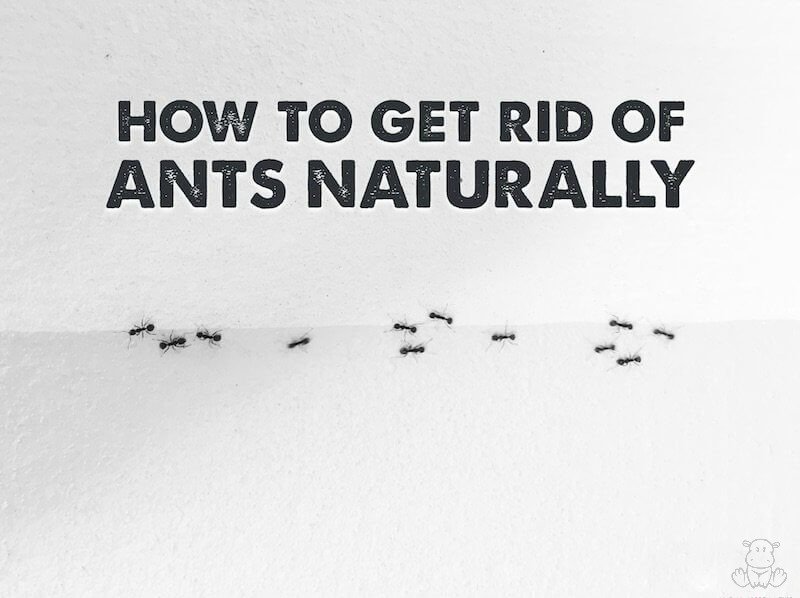
How To Get Rid Of Sugar Ants In The House
Source: https://mommypotamus.com/how-to-get-rid-of-ants/
Posted by: cookewinger91.blogspot.com

0 Response to "How To Get Rid Of Sugar Ants In The House"
Post a Comment